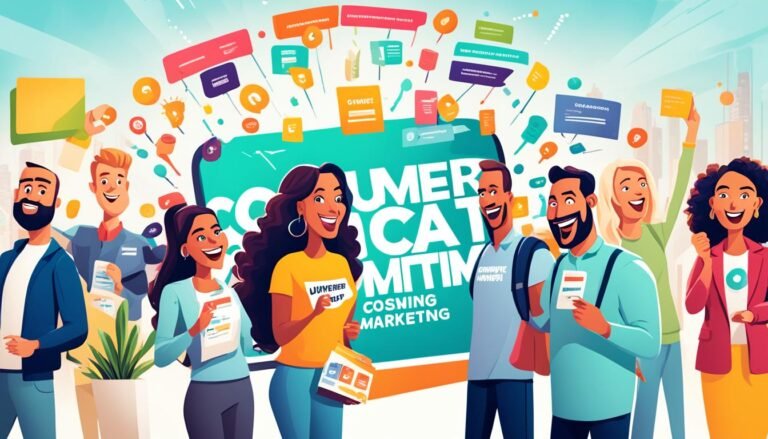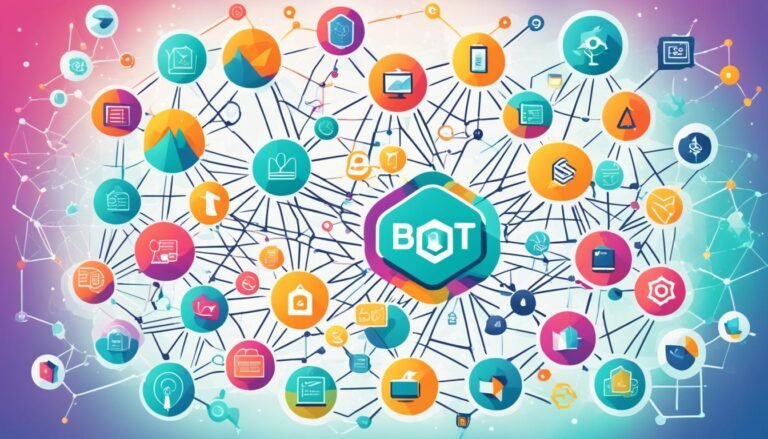The Role of AI in Transforming Content Marketing This Year
In 2023, AI use grew nearly ten times, with 87% of marketers trying or using AI tools. The Conference Board and The CMO Study show this growth is changing how brands make, manage, and share content. Many experts say AI is making human creativity better and letting teams focus on big ideas.
Three of the top five AI goals for companies are about marketing, showing a growing interest in content strategies. The Role of AI in Transforming Content Marketing is more than just automating tasks. It helps marketing teams improve messages, make content faster, and find new customer insights.
Key Takeaways
- AI usage surged nearly ten times among the public in 2023
- 87% of marketers reported experimenting with or using AI tech
- Top AI objectives include marketing tasks and content creation
- Leaders see AI as a way to boost creativity and streamline projects
- The Role of AI in Transforming Content Marketing spans analytics and day-to-day operations
Understanding the Rapid Growth of AI in Content Marketing
More companies are turning to automation to keep up with digital demands. Deloitte Digital and Gartner studies show tools like ChatGPT and Jasper AI are key. They speed up tasks and offer valuable insights.
Reports say 65% of businesses use AI for new content, social media, and campaigns. Netflix’s recommendations show how personalization boosts engagement. HubSpot uses similar tech to improve strategies, leading to more sales and loyalty.
Google Analytics 4 uses advanced algorithms to spot trends and guide content choices. This helps teams focus on creative work that makes a brand stand out. AI is now crucial for brands wanting to stay ahead, enhance customer experiences, and innovate quickly.
The Role of AI in Transforming Content Marketing
Brands around the world are using Artificial Intelligence to change Content Marketing. The Conference Board found that most marketing leaders think AI will make them more productive. This leads to better performance and smarter decisions.
With AI’s help, many professionals can focus on creative ideas and planning. They use AI to get insights for brainstorming and keep content consistent on different platforms.
Streamlining Content Strategy
AI tools help with finding topics and planning schedules. They make sure every piece of content meets its goals. This method uses data to spot trends and make messages clearer across various channels.
Automating Repetitive Tasks for Efficiency
Tasks like data entry and quick copywriting are now done by machines. This frees up time for more important work. It lets teams focus on being creative and engaging with their audience.
| AI Use Case | Key Benefit |
|---|---|
| Campaign Scheduling | Improves consistency |
| Data Entry Automation | Reduces errors and saves time |
| Topic Research | Identifies emerging trends |
How AI Enhances Content Strategies
By 2024, experts say AI will change marketing plans and campaigns to meet audience needs. Machine learning algorithms quickly find patterns, helping teams know what topics and channels work best. This AI power lets marketers improve their editorial calendars and distribution tactics.
Companies use real-time insights to understand consumer behavior and target their content effectively. This method helps tailor messages for different groups and adjust strategies as needed. AI in content marketing makes strategies better, reducing guesswork and focusing on results.
- Faster data processing for timely content updates
- Enhanced personalization for specific audience segments
- Adaptable calendars for trending topics
| Strategy Enhancement | Benefit |
|---|---|
| Predictive Analytics | Increased Engagement |
| Automated Scheduling | Improved Efficiency |
Leveraging AI-Powered Content Marketing Techniques
Brands are now using advanced tools to guess what users want and come up with new ideas. Tools like ChatGPT can write drafts in just minutes. This helps teams avoid doing the same tasks over and over.
These AI tools fit right into what teams already do. They help keep the brand’s voice consistent while still being creative. Using these methods can lead to more people signing up and connecting with the brand on a deeper level.
AI Tools to Optimize Workflow
ChatGPT helps make messages clearer by outlining and suggesting changes. Tools like HubSpot can schedule posts automatically, saving a lot of time. They also offer features like finding keywords and suggesting content on the fly.
This makes it easier for teams to focus on planning and strategy. They don’t have to spend as much time on the details.
Data-Driven Insights and Analytics
Marketers use Google Analytics to find out what content works best and how people are engaging with it. They also use AR platforms to give potential buyers a unique experience. Studies show that 85% of professionals are learning more about AI to do their jobs better.
Improving in these AI areas helps spot trends, target better, and find new chances. It’s all about making marketing smarter and more effective.
| Statistic | Source | Benefit |
|---|---|---|
| 63% of marketers use AI | Forbes | Faster campaign improvements |
| 85% updating skills | Industry Survey | Greater AI-driven innovation |
Driving Engagement Through AI-Driven Personalization
Personalization makes marketing better and builds stronger bonds with customers. AI helps by finding what each person likes within a group. Netflix and Amazon use AI to suggest things that keep users coming back.
Marketers can use chatbots for quick answers and product tips. Epsilon says 80% of customers like it when they get things just for them. Predictive analytics can also keep more customers coming back, up to 10% more (Gartner, 2022).
Segmenting Audiences with Artificial Intelligence
AI makes audience segmentation better. McKinsey found that using AI for targeting can increase marketing ROI by 15%. This helps find out what each person wants and keeps campaigns on track.
Delivering Tailored Experiences
Creating content for each user is key. Dynamic pricing and personalized emails make customers happier and more loyal. Each message is sent to the right person at the right time.
Measuring Engagement and ROI
AI tracks how well campaigns do and saves money on support costs with chatbots (Juniper Research, 2020). This focus on data makes sure the impact of AI is clear from the start.
| Strategy | Benefit | ROI Potential | Reference |
|---|---|---|---|
| AI-Driven Segmentation | Refined Targeting | +15% | McKinsey, 2021 |
| Chatbots | Faster Support | Cost Savings | Juniper, 2020 |
| Dynamic Pricing | Profit Boost | +5% | Deloitte, 2021 |
| Personalized Emails | Higher Click-Through | +41% | Campaign Monitor, 2021 |
Identifying the Best AI Content Creation Strategies
AI is changing how we create content in marketing. Brands test small-scale to find the right AI Content Creation Strategies for their goals and style. They see which methods work best with their audience.
Combining human creativity with AI’s speed is key. Content Marketing AI Tools help make content faster. But, it’s important to keep the content real and true to the brand. Some worry about AI spreading false information or missing important details. The best campaigns use AI insights and then have a human check the final product.
“Marketing is no longer about the stuff you make, but about the stories you tell.” – Seth Godin
To find the best AI tactics, follow these steps:
- Start with small tests to see how well it works and fits your brand
- Find a balance between AI’s speed and human creativity
- Always check AI’s work for accuracy
- Make sure the final content sounds like your brand
Here’s a quick look at some top tools:
| Tool | Key Benefit | Potential Use Cases |
|---|---|---|
| Grammarly | Automated editing assistance | Improving grammar and style |
| Jasper | AI-driven copy generation | Drafting marketing posts |
| Google’s Looker Studio | Data analysis automation | Identifying trends for content plans |
Conclusion
AI is changing how we plan and share content. Marketers use AI for sorting audiences, creating content, and tracking how well it does. Large Language Models (LLMs) look at social media to guess what people might like next.
These tools help make content faster and more relevant. They check how people feel about a brand, adjust the tone, and improve SEO. This means less work for humans and more room for creativity.
Using AI for content marketing means focusing on personal touches and using data right. As AI rules change, companies that are open and honest gain more trust. Those who use AI all the way through can meet customer needs and stay ahead.
Brands that use AI well keep an eye on privacy laws. They make sure data is used right and connect with people in real ways.
Source Links
- How AI Is Transforming Marketing (2024)
- Council Post: How AI Is Transforming The Marketing Industry
- The Role of Artificial Intelligence in Digital Transformation
- AI and the Future of Content Marketing
- The Rise of AI Content Creators: Transforming Marketing | ContentBASE
- How AI is Impacting Digital Marketing
- Council Post: The Role Of AI In Digital Marketing: What You Need To Know
- AI in Content Marketing: How Creators and Marketers are Using It in 2024 [Data]
- The role of artificial intelligence in marketing
- How AI Is Transforming Marketing Strategies in 2024?
- How AI is transforming marketing – Marketing News
- The Transformative Role of AI in Content Marketing: A Game Changer for Busy Business Owners
- Leveraging AI for effective marketing automation
- Leveraging AI-Driven Content Marketing to Boost ROI and Enhance Engagement
- How AI Personalization Marketing Is Transforming Customer Engagement And Driving Sales – Brain Pod AI
- Trends in Customer Engagement: AI and Personalization
- Revolutionizing Marketing: The Power of AI-driven Personalization
- How AI is Revolutionizing Content Creation in Marketing
- AI in Content Marketing: How We’re Wielding AI for Good (Results) – Digital Commerce Partners
- The Role Of AI In Marketing Today: How AI Is Transforming Every Channel | MLCworks
- The Role of Artificial Intelligence in Marketing






